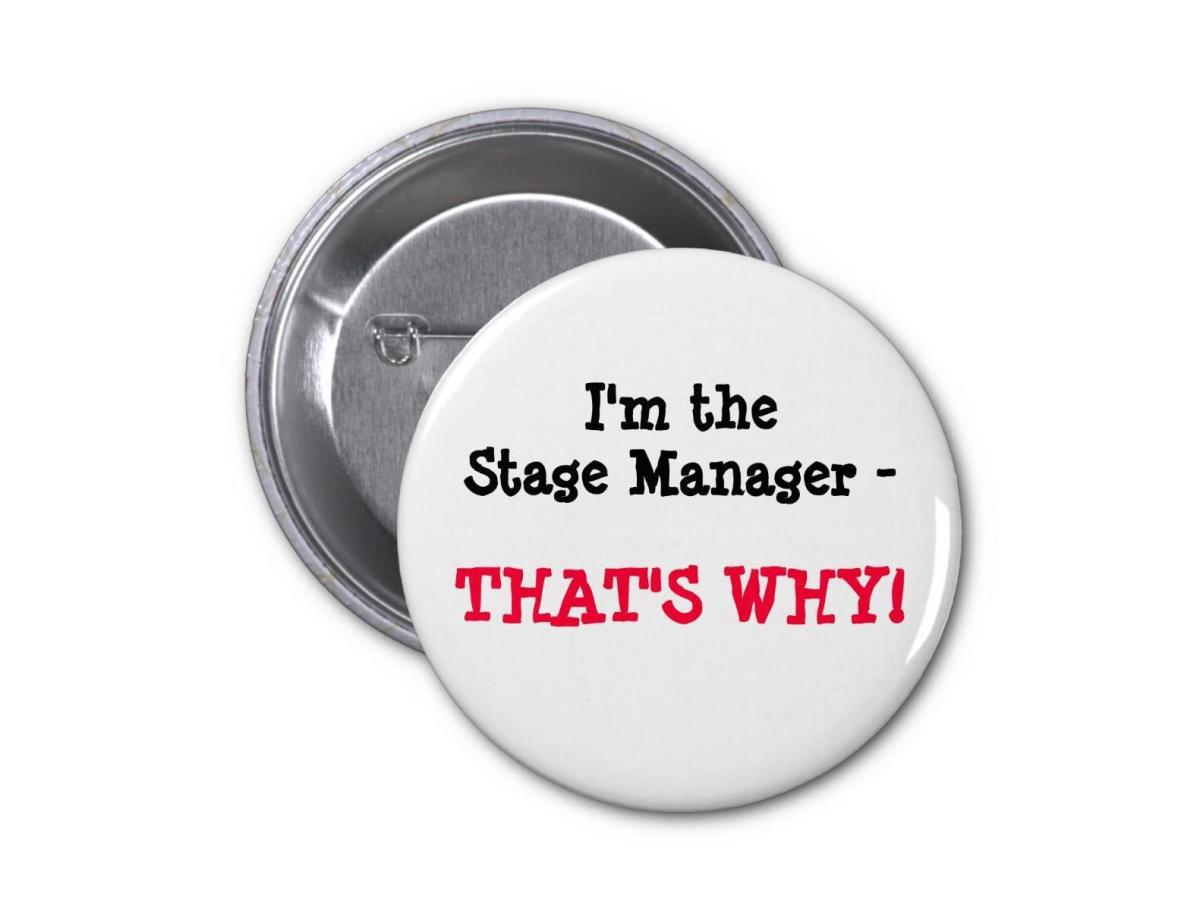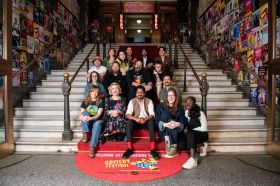Image via www.zazzle.com
Stage managers are an integral part of the theatre ecology, though the importance of their role is rarely recognised by the general public. From the earliest rehearsals to the final performance, their continued and calming presence helps ensure that shows run smoothly, whether on the road or in the most familiar of venues.
If you enjoy sticking to schedules, problem-solving, and helping people, this could be the career for you. But how does one become a stage manager – and what’s a typical day on the job like?
Like many working in the performing arts, stage managers often start young – though it can take time before they find their true niche.
‘It started back in high school really – you know, the old school musicals – and then all I knew was that I wanted to work in the entertainment industry but I wasn’t quite sure where,’ said Melbourne Theatre Company (MTC) stage manager Christine Bennett.
Having enrolled in humanities at Ballarat University, Bennett was slowly seduced by the drama department.
‘So I finished my first three year course in humanities and then I changed courses and started the three-year course majoring in production skills. And yeah I was hooked by then, seriously hooked,’ she said.
Similarly, Kelly Blumberg, Production Manager at Tracks Dance Company in Darwin, flirted with performance and film in high school before gravitating towards stage management.
‘When I applied for university I wasn’t sure if I wanted to do film, or something in backstage theatre, so I chose a course that did mostly theatre but with a few units of film making. At this point I didn’t even really fully understand what a stage manager’s role was, but I quickly learned that being a stage manager was about being really organised, and finding ways to work with all different types of people to achieve a common goal – two things that I feel are fundamental strengths of mine,’ Blumberg told ArtsHub.
Formal training versus learning on the job
Undertaking formal study in stage management and associated theatre production skills is generally recommended by all the stage managers we spoke to.
Richard Whitehouse, a touring stage manager who is currently attached to the Performing Lines football-inspired dance production SDS1, studied at NIDA for three years and holds a Bachelor of Dramatic Art majoring in theatre production.
‘A big cornerstone of the NIDA production course is stage management, because it’s teaching you communication skills, time management skills, how rehearsal rooms are run – the sort of theatre etiquette which is established, and which carries on if you go on to be a lighting designer, a sound designer, a company manager,’ he said.
‘But the cornerstone of the course is stage management. So you start as an ASM running props and setting set marks and making sure people are making their costume calls, and end up calling shows and running a stage management department. So people would go on to Opera Australia and the like – it gives you a good grounding across that sort of theatre etiquette and what’s required to work successfully at a professional level.’
Bennett also recommends formal training. ‘It’s important in the sense that it gives you a place to make mistakes, really, before you’re out there in the real world being paid to do a job. I think learning on the job as well is really great, but I suppose with the training … it’s actually getting to go and do the secondments as well and getting a little bit of a taste of [everything] whether it’s dance or big musicals or theatre, because they’re all quite different and each stage manager is different; and eventually you find which actual art form suits you best.’
Michelle McKenzie works regularly as a stage manager in Sydney’s independent theatre sector with companies including Sport for Jove, Rock Surfers and Red Line Productions. She said: ‘I think training of some kind is important. You learn so much on the job: no amount of lecture room conversations, or even practical activities will really drive home exactly what is required of you in the position, how to solve problems, or the temperament you need to develop. But it definitely helps give you a foundation.
‘I’m so grateful for my mentors, and champions who helped me not only in drama school, but who were there when I graduated to help me through when I was stumbling around my first couple of jobs. So I think training, formal or informal is of course important, but that’s only the very beginning of your development as a stage manager,’ McKenzie added.
A day in the life of a stage manager
Blumberg laughed when asked what a typical day in her profession entailed: ‘I wouldn’t say that there is a typical day as a stage manager!’
McKenzie agreed, adding that there are roughly three different sorts of days in her job.
‘In rehearsals: set the room, mark up the space (lay tape down on the floor according to the dimension of the set design – a way for the actors and creatives to get a sense of the space they have to play with before we actually get the set, or are in the theatre). Write notes about everything that happens in the room, notate the blocking (where everyone moves and when), stay on the script and call out lines when the actors need it, take care of props, make sure everyone gets their breaks, and that we’re moving forward in the time we had planned. Change the props and the set, time how long our runs are going. Then you pack up, send out rehearsal reports, do some scheduling. Big days!
‘In performance times: it always changes. You test lighting and sound, check the costumes, pre-set the stage and set the props. I often operate my own shows (as a lot of us do in independent theatre, so I’m normally the one pressing all the buttons for every lighting and sound change) but sometimes I’ll have a lighting or sound operator where I get to call the show. Then I normally will have costumes to wash (and props or costumes to fix) and reset the space to the top of the show,’ she continued.
‘In tech week: everything and anything!’
As a touring stage manager, where he often finds himself doubling as lighting operator and sound operator, Whitehouse’s day is equally demanding.
‘With SDS1 we have a one-day bump in, so we open the night we arrive. So at ten o’clock Ahilan [Ratnamohan] and I arrive at the venue, and we call the lighting focus so we can set all the states; we work through each scene … because this quite a physical show and requires a lot of hand-eye coordination, so we have to set the lighting levels bright enough so Ahil can juggle the soccer ball and be able to kick the ball up and not be blinded by the light – so we go through each state to see that it’s okay, and with the lighting designer’s vision in mind,’ he explained.
‘And then we go through the scenes, we balance all the sound levels after lunch, we do a bit of a cue to cue in rehearsal, and then we do a show at 7:30 that evening. So we’ve basically got a pretty tight day to get it all kind of locked in to the desired results … maintaining the director’s vision and what we’re trying to achieve. That requires everything from meeting front of house to setting up the dressing room, all that sort of thing. Understanding the procedures, being inducted into the theatre, knowing where the nearest coffee is, all those important things that happen on a one-day show.’
Highlights and lowlights
All agreed that working in stage management is demanding, but also incredibly rewarding. As Bennett put it: ‘It is a fairly all-consuming type of job. If you choose to be a stage manager you have to have a passion for it, because you are at work a lot … So you are fully committed and because it’s six days a week there’s not that much family time,’ she laughed.
‘You might have to do family functions on Sundays, and that doesn’t really work if you’re in musicals; you’ll be working Sundays as well. So it is all-consuming and that can get a bit much at times.
‘But on the other side, to me, there’s nothing better. I quite like working on comedies or shows that have funny elements within them; to hear an audience of 500 or 800 or at the Fairfax, 350 people laughing – you can’t get a better job than that if you ask me. Even though I’m not the one who makes them laugh, I’m part of the process, and that’s a pretty special thing, because there’s a lot of sadness in the world so to have people having a good time is pretty nice,’ said Bennett.
McKenzie emphasised the enjoyment she gained from working in the independent sector: ‘I get to sit in on rehearsals with brilliant directors, and awesome actors – many of whom are now my friends. The independent theatre scene is so incredible to be a part of. Particularly when working with companies with so much heart and joy such as Sport for Jove and Old Fitz Theatre. The highlights don’t always come from the big budget experience.’
For Blumberg, there are some unique challenges that come with working outside of the Melbourne-Sydney axis.
‘In the Territory we often work in very remote locations, and we are a community that likes to work outdoors. With our humidity and rain this provides a challenging set of problems. We are also somewhat lacking in some resources (sets, props, costumes, equipment) and being so far away from the East Coast, it can sometime take a long time to get things up here – and the freight can be expensive!’ she said.
McKenzie also noted: ‘It’s a highly stressful job. Keeping calm throughout every situation is incredibly important – but not always an easy thing to do. Plus one of the great challenges, which is also one of the great joys, is that you have to learn new venues constantly, new systems, new and sometimes strange skills. So you’re always learning, and a lot of the time feel out of your depth. But that can be one of the fun parts too; it’s always interesting.’
Whitehouse emphasises that the job eats up a lot of time – especially when you’re on the road.
‘Sometimes they’re very long weeks, and if you’re doing multiple shows in multiples towns in a week it’s your life for that chunk of time and you’ve really just got to be single-minded about it and push through ‘til the grass is greener,’ he explained.
‘It’s sometimes very hard, physically and mentally, to maintain that level of focus, because you’re tired and when you’re tired sometimes you make simple mistakes like not setting the handkerchief for scene one or, you know, forgetting to fill the water-bottle. Just something simple that might just seem like a simple, 30-second action but in the long run it could make or break a scene when the actor goes to the prop and the prop is not there. So that’s why we have checklists to tick for those sleep-deprived mornings.’
So you want to be a stage manager?
In terms of advice for would-be stage managers, Whitehouse said: ‘Work hard, pay attention, and a little bit of deference sometimes. I know a lot people – and myself included when I was a young training student – I thought I knew everything, which is of course not the case. I don’t know it now! It’s just about trying to gather those skills: listening and learning. Because the things you learn even in passing sometimes come back to help.’
McKenzie said: ‘It can be a hard job, and you’re always, always busy – but it’s worth it. Don’t forget to breathe, and fake it till you make it – a lot of people are figuring out what’s going on as they’re doing it, and that’s ok. Everyone starts somewhere.
‘Make friends with your black clothing – that’s your wardrobe,’ she continued. [And] seek out Assistant Stage Manager jobs, or assist on productions in any way. You learn an unbelievable amount from watching backstage theatre in motion. Plus, some of the most fun I’ve had on shows was as an ASM backstage.’
Bennett stressed the mind-set necessary for the role: ‘You have to really enjoy sticking to schedules – it’s something you have to have a bit of a passion for, because you have to help people stick to their schedules or else you don’t get anywhere.
‘And a lot of the job is about putting other people first instead of yourself and you have to actually enjoy doing that. And I don’t mean you’re like a second class citizen, but you have to see that that’s an important cog of the machine. You’re a facilitator I suppose, and you have to enjoy doing that. And I think you have to care about people – like honestly care about people, because a lot of the time people are in very vulnerable positions and you have to be able to help them through that, at different times. So yeah, sometimes you’re a bit of a mother hen I suppose.
‘And you have to enjoy problem-solving, because a lot of the time that’s what it’s about, trying to help make what’s in a director’s imagination come to life – in the technical format as opposed to the more creative side of what the designers do,’ Bennett concluded.
SDS1 is touring nationally in September-October: see website for details.
Christine Bennett is currently stage managing MTC’s The Weir, now showing until 26 September.
Michelle McKenzie is stage managing the Independent Theatre Fundraiser at The Old Fitz Theatre, Woolloomooloo, on Saturday 22 August
.
Previous articles in this series:
Career spotlight: Costume designer
Career spotlight: Contemporary jeweller
Career spotlight: Floral artist





